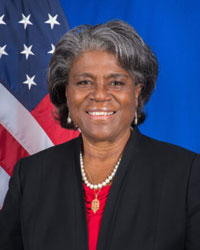
United States
|
US Supports Permanent Seat For India, Japan, Germany; Two From Africa In Expanded UN Security CouncilAmbassador Linda Thomas-Greenfield Calls For Engaging In Text-based Negotiations On Council ReformsBy Deepak Arora
In her address at the Council on Foreign Relations regarding the future of multilateralism and UN reform, the U.S. Ambassador to the United Nations also advocated a new elected seat on the Council for Small Island Developing States. These 39 states are home to 65 million people, across over 1,000 islands. In her third major announcement she said that the United States supports engaging in text-based negotiations on Council reform. In her remarks, she reiterated Washington's support for a permanent seat for India on the UN Security Council. This position aligns with the long-standing U.S. stance that India, along with Japan and Germany, should have permanent representation on the Council. Thomas-Greenfield acknowledged that expanding the Council’s permanent membership is critical to maintaining the UN's legitimacy and effectiveness. She emphasized that the Security Council must evolve to better represent the diverse and changing global landscape, including populous and economically influential nations like India. By advocating for India’s inclusion, the U.S. hopes to address longstanding calls for reform that aim to modernize the UN's most powerful body. The support for India's permanent seat is part of a broader effort by the U.S. to make the Security Council more inclusive and capable of tackling 21st-century challenges. This is in line with other U.S. reform proposals, including the addition of permanent seats for African nations and a rotating seat for Small Island Developing States. She emphasized the need to modernize the UN to better reflect today's geopolitical realities. She highlighted the growing demand for reforming the UN Security Council, a body whose current composition, established post-World War II, no longer mirrors the global landscape. She stressed that Africa, which currently holds rotating non-permanent seats, needs permanent representation to adequately address global challenges that disproportionately impact the continent. This move is part of President Biden's broader goal to make the Security Council more inclusive and representative of today's world, building on previous U.S. support for permanent seats for India, Japan, and Germany. By advocating for a new elected seat on the Council for Small Island Developing States, the Ambassador acknowledged the critical role these nations play in addressing international issues like climate change. Ambassador Thomas-Greenfield underscored the importance of ensuring these nations have a consistent platform within the UN, given the unique challenges they face. Thomas-Greenfield called for action on Security Council reform, noting that years of discussion have yielded little progress. She advocated for moving beyond endless conversations toward concrete negotiations on text-based reform, even if consensus among all 193 UN member states is unlikely. The U.S. hopes this push will help drive meaningful reform that reflects the current global order. This push comes at a time when geopolitical tensions have exposed the limitations of the current Security Council structure, particularly in its ability to address conflicts such as Russia’s invasion of Ukraine and Israel-Gaza war. Reforming the Council is seen as essential to ensuring it remains a credible and effective forum for maintaining global peace and security. |
|
|||||||
Aviation
| Business | Defence | Foreign
Affairs | Communication | Health
| India | United Nations
India-US
| India-France | Entertainment
| Sports | Photo Gallery |
Tourism | Advertise with Us
| Contact Us
© Noyanika International, 2003-2009. All rights reserved.
 NEW YORK, Sept 15: In a historical and landmark statement, Ambassador Linda Thomas-Greenfield has announced a new road map to reform and modernize the United Nations to better reflect today’s geopolitical realities. Besides reiterating Washington's long-standing support for a permanent seat for India, Japan and Germany, Ambassador Linda Thomas-Greenfield announced U.S. support for expanding the Security Council to include two permanent seats for African nations.
NEW YORK, Sept 15: In a historical and landmark statement, Ambassador Linda Thomas-Greenfield has announced a new road map to reform and modernize the United Nations to better reflect today’s geopolitical realities. Besides reiterating Washington's long-standing support for a permanent seat for India, Japan and Germany, Ambassador Linda Thomas-Greenfield announced U.S. support for expanding the Security Council to include two permanent seats for African nations.